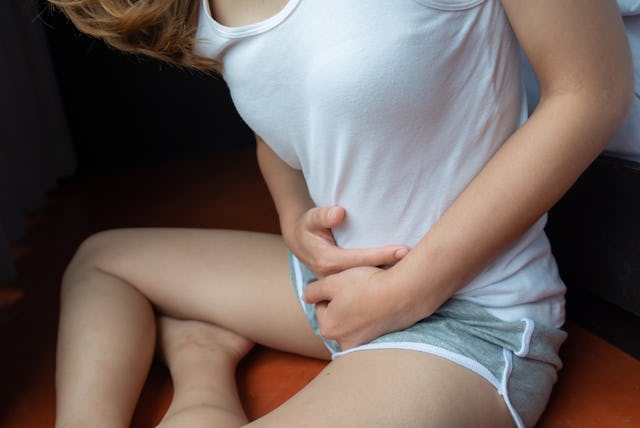Bloating During Ovulation? It's A Thing (That Sucks)
Here’s what causes it, plus what you can do to alleviate it.

For some of us, ovulation is a juicy time — a time when our senses are at an all-time high as we experience an increase in energy and sex drive and a general high-vibe feeling as our body prepares for a potential baby. But for others, ovulation can mean fatigue, tender breasts, and bloating.
We all know bloating sucks. It’s uncomfortable and annoying and generally doesn’t make us feel good. As if bloating during your period or even after sex isn’t bad enough, there are plenty of people who experience bloating during ovulation, which can rival PMS symptoms. (#nothankyou)
If you want to learn more about why you’re bloating during ovulation and how to relieve some of those icky feelings, read on for tips.
What is ovulation?
First, a quick reminder about ovulation: Ovulation happens when an egg is released from your ovary into your fallopian tube, which may or may not be fertilized by sperm. It typically occurs about 11–21 days before the start of each menstrual cycle, depending on the length of your cycle. If fertilized, the egg could travel to the uterus and develop into a pregnancy if implanted.
Given the info above, it’s unsurprising that a lot happens with your body around ovulation. Everything your body is enduring during ovulation — whether it’s the follicle deciding to release the egg, the eventual release of each egg, or the preparation of your uterus for possible implantation — is all driven by our reproductive hormones. So, guess what is causing this annoying bloating?
That’s right: your hormones.
What causes bloating during ovulation, and how long does it last?
Generally, bloating during ovulation occurs on days 11 to 14 of your menstrual cycle and can last a few hours up to a few days.
Bloating during ovulation may occur due to increased estrogen levels before the luteinizing hormone (LH) surge, which happens just before the body starts to ovulate.
As a result, changes in hormone levels may lead to your body retaining water, causing you to feel and look bloated. You might even crave salty foods at this time, like chips, french fries, cheese, and basically all the delicious-slash-highly-processed snacks we should enjoy in moderation. You may even notice your breasts becoming a little fuller at this time, too.
While you might not love the uncomfortable feeling or how your clothes fit due to ovulation bloating, the good news is that fluid retention — and the cravings — from ovulation should start to get better within a couple of days.
How do you alleviate bloating during ovulation?
To help curb the bloat, do the following:
- Increase your water intake and/or ensure you hydrate regularly with water and herbal tea throughout the day.
- Reduce your sodium intake, including eating processed food.
- Reduce intake of foods that cause bloating and gas, like wheat, onions, broccoli, garlic, cauliflower, cabbage, artichokes, apples, and beans.
- Take a magnesium supplement, but only after checking with your doctor first.
- Engage in regular cardio aerobic exercise — even a brisk walk helps.
- Bloating can also worsen due to higher stress levels, so it’s a good idea to regularly practice stress-relieving techniques such as meditation, breath work, yoga, and mindfulness daily (which are all pretty healthy things to do with or without the bloating).
What should you do if bloating during ovulation doesn’t get better?
Of course, it’s always a good idea to consult a physician if bloating during ovulation continues for more than a few days, is particularly painful, or if you’re concerned your bloating is due to a possible medical condition.
It’s important to note that bloating in some people that is not PMS-related could occur due to various medical conditions, including endometriosis, an ovarian cyst, or polycystic ovarian syndrome (PCOS).